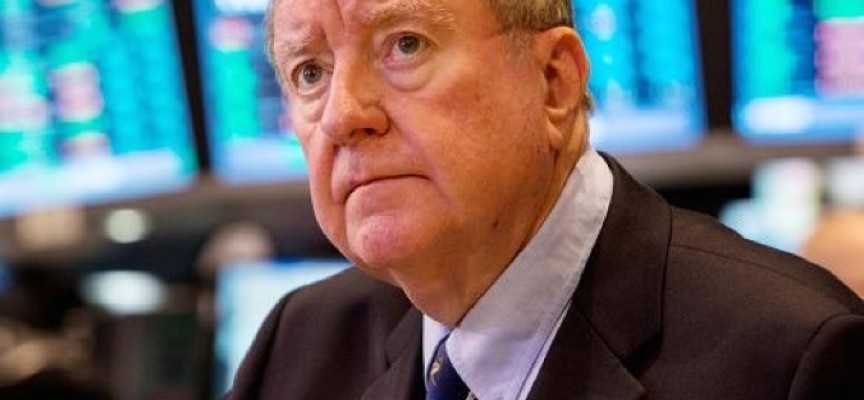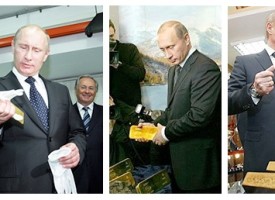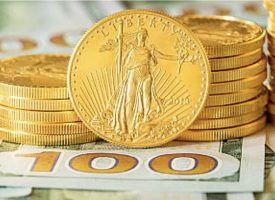Today legend Art Cashin warned there is more to be worried about than just the Coronavirus.
On This Day…
February 12 (King World News) – Art Cashin: On this day (+2) in 1876, one of America’s most celebrated inventors was to learn the promise and punishment of punctuality. His name was Elisha Gray and he had already moved interactive communications light years ahead. He had invented an automatic relay for the telegraph which sped up communications by half. He then invented a trans-printer which read Morse code and printed the words in typeface. Partially inspired by the ease and speed provided by Gray’s inventions, the telegraph business took off.
That led to capacity constraints and demands for a telegraphic super highway. Since there were no fiber optics at the time, they needed something new. Gray decided to try sending simultaneous multiple messages by using a different musical tone for each message. It was ingenious….but still had a few bugs. And, while Gray worked on them, word spread that his new system had a special quality…..it could transmit the human voice. But Gray thought the ability to send eight telegraphic messages over the same wire simultaneously was more important.
While he plugged away at that, his partners warned that others (including Edison) were said to be working on voice transmission. So just to tie up loose ends, Gray dropped by the patent office to drop off his letter of intent on the telephone. Unfortunately, a guy named Alexander Graham Bell had dropped by just two hours earlier. That coincidence of time would result in patent lawsuits over the next three decades. In an odd twist, the lawsuits became so expensive that Bell and his father-in-law offered Western Union the rights to the telephone for just $100,000. In a decision studied in today’s business schools, Western Union replied…..We’re in the telegraph business not the phone business….and that’s where they stayed….If they had only realized they were in the communications business!!!! They might have ruled the world.
It was communications that moved markets yesterday and, once again, a large part of the communications had to do with the coronavirus outbreak.
Stocks started with an upbeat tone amid signs that the virus outbreak might be plateauing. The bulls built on the better mood over the first 90 minutes of trading, taking the Dow back up to levels last seen at last Thursday’s intra-day highs. That seemed to induce a mild pause in the post-opening rally.
At the same time, the CDC made some comments on the coronavirus. Those comments seemed to cast doubt on both the methodology and accuracy of the tallies coming out of China. That induced enough doubt in some of the buyers, adding to the pause in the rally.
Then Boeing announced it had received no new orders for planes. That’s none as in zero. Given the heavy influence of Boeing on the U.S. GDP, that sent some of the buyers to the showers.
I noted the change in an email to some friends:
The late morning pullback was very Dow centric. Traders feel the CDC undercut things by suggesting that virus cases may be being undercounted. That sparked credibility questions on Chinese counting.
Then the negative news from Boeing tipped things over and took the Dow into negative territory.
Trying to stabilize now.
They did manage to stabilize as we slipped into afternoon but they seemed unable to restart the rally. Instead, the indices shuffled sideways as the day wore on.
In the final hour, stocks looked like they might roll over and, ultimately, close down on the day.
Instead, the market on close indications suggested there would be over 700 million dollars to buy on the bell. That seemed to inspire the bulls and they bid stocks mildly higher into the close.
All in all, a rather neutral day with virtually no changes to the technical backdrop.
Running Out Of Ammunition – Some traders found part of Powell’s prepared testimony a bit concerning. Here’s how Bloomberg addressed that section:
Federal Reserve Chairman Jerome Powell came close to acknowledging that the central bank may not have the firepower to fight the next recession and called on Congress to get ready to help.
The current low level of interest rates “means that it would be important for fiscal policy to support the economy if it weakens,” he told the House Financial Services Committee on Tuesday.
The remark, which came in opening testimony that Powell is due to repeat to a Senate panel on Wednesday, was an unusual appeal by the head of a politically independent institution that is used to combating economic contractions on its own.
But it highlights the difficulties that the Fed and other major central banks face in a world of historically low interest rates and why tax cuts and government spending increases may also be needed to fight future downturns.
That concern was neither restricted to Powell or the Fed. A similar concern was voiced by Christine Lagarde of the ECB. Again, we turn to Bloomberg for comment:
Speaking in Strasbourg on Tuesday, European Central Bank President Christine Lagarde was more explicit than Powell about the limits to central bank power. “Monetary policy cannot, and should not, be the only game in town,” she told European lawmakers. Admitting he was “straying a bit” from his remit, Bank of England Governorr Mark Carney also backed the U.K. government’s new spending program.
The Fed is engaged in an in-depth review of its policies and practices that is aimed at finding ways to enhance its recession-fighting abilities.
Powell’s comment on Tuesday though suggests he recognizes that there’s just so much the central bank can do in that regard.
So maybe there is more to be worried about than coronavirus.
Overnight And Overseas – Growing belief that the rise in virus outbreaks may be flattening out put a bid under Asian equity markets. Stock indices in Tokyo, Hong Kong, Shanghai and India all closed up the equivalent of about 250 points in the Dow.
Markets in London, Paris and Frankfurt are all trading modestly higher, up about half the level of their Asian counterparts.
Among other assets, Bitcoin is higher, trading around $10,300. Gold is basically flat, while WTI is higher, trading just under $51, helped by Russian comments. The euro is flat against the dollar and yields are a smidge higher.
Consensus – Bernie inches closer to nomination as moderates continue to split their votes. If Warren drops out, it could make Bernie even stronger. Markets seem to want to wait for Super Tuesday to have election as a factor.
Stay wary, alert and very, very nimble.
2020: A Year Of Warnings
ALSO RELEASED: 2020: A Year Of Warnings CLICK HERE TO READ.
Gerald Celente discusses China shutting down entire cities and industries and quarantining and rounding up people. To listen CLICK HERE OR ON THE IMAGE BELOW.
© 2020 by King World News®. All Rights Reserved. This material may not be published, broadcast, rewritten, or redistributed. However, linking directly to the articles is permitted and encouraged.








